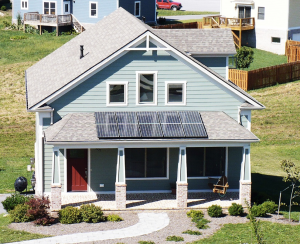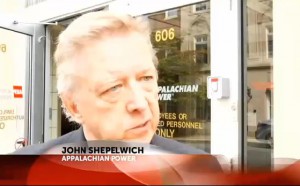Front Porch Blog

Virginia ratepayers made their voices heard before important orders by the State Corporation Commission on residential solar fees and electricity rates.
Here’s the bad news: Virginia’s State Corporation Commission (SCC) has approved a charge of about $3.50 per kilowatt on Appalachian Power Company customers with solar arrays larger than 10 kilowatts.
But it’s even more disappointing in light of Virginia’s recent explosion in residential solar installations and our state’s opportunity to lead by encouraging efforts that make clean energy affordable.
We’ve covered the “solar standby” charge problem and examined theories about why such “taxes on the sun” are spreading. Regardless of the reasons behind Appalachian Power’s pursuit of the charge, it is now in place and applies to five accounts currently and any customer who installs a new solar system larger than 10 kilowatts in the future. But there’s a more interesting aspect of the SCC’s recent order that’s worth a look.
Elsewhere in the very same ruling, regulators rejected an APCo proposal to raise fixed fees for residential customers that would have had serious consequences for energy use, conservation and renewable energy in the region.
This sort of restructuring spells trouble for advancing technologies like solar, small residential wind and energy efficiency. It’s an issue that’s been popping up recently in rate hearings around the country. In states such as Nevada and Wisconsin, utilities have proposed major changes to the way most customers’ bills are set up in the form of vast increases in fixed monthly fees and cuts to usage-based rates. Imagine being a utility and feeling concerned about how the public views the way you do business. Do you think you might be tempted to announce cuts to rates, while making up the balance from fees that many customers might overlook on their bills? APCo proposed a near doubling of the flat fees their residential basic customers pay from $8.35 to $16.
Public relations aside, it only takes a quick thought exercise to see how these changes would play out for customers in real life: a middle-class family in a mid-size home might not see a difference in their bill at all, with savings on per-unit energy costs negated by higher fixed fees. A family that lives in a large home and uses a lot of electricity each month might see lower bills since the fixed fee makes up a smaller share of their bill. But a small home of a low-income family that uses less energy, perhaps with fewer electronic gadgets and a habit of keeping the thermostat low during colder months, could be stuck with higher bills in spite of lower rates per kilowatt-hour as fixed charges drive up their energy costs.

Appalachian Power spokesperson John Shepelwich speaks to the media about the reasons the utility pursued a “standby” charge on customers that have gone solar.
Shifting toward higher fees paid by all customers regardless of how much energy they consume and away from usage-based charges has been criticized in other states — not only on grounds of economic injustice but also for the obvious way it undercuts the incentive to conserve energy, and for the less apparent way it can deter investments in clean energy.
Lowering electricity rates fundamentally affects the calculation of whether installing a household solar array makes financial sense, and results in a big reduction in the returns that a solar owner would otherwise expect to receive The SCC found that APCo had not established that the charges were reasonable and rejected the increases, but experts in the region are looking ahead to other methods of rate restructuring utilities might pursue including minimum bills.
The second positive outcome of the APCo case came particularly as a result of representation by the Southern Environmental Law Center and the advocacy of clean energy supporters like you. It is the SCC order on APCo’s long-term resource plan that contains the seeds of future climate progress. In the big picture, it may be the most significant part of all the SCC’s orders from last month: the directive that APCo monitor the development of the EPA standards on carbon from power plants and model different methods to comply.
For regulators to tell a utility with a generation mix that is projected to remain over 80 percent coal-based through 2027 that it must model methods to address carbon pollution is huge. And the way the EPA’s Clean Power Plan is written, options that will truly benefit customers like investing in energy efficiency programs (which are also the lowest-cost options for compliance) should take center stage in the utility’s future plans to reduce its greenhouse gas intensity. It’s due to the engagement of several customers who have gone solar that wrote letters to the SCC, the dozens who commented in favor of a cleaner, more reliable, more affordable energy future for the region, and those who came to Richmond to be heard in person, that our message got through.

Virginians advocate for clean energy outside the state Capitol Building. Photo by Virginia Sierra Club
From here, it’s important to do your part to make sure your legislators are aware of these issues. The General Assembly originally approved a bill that authorized solar standby charges because they were portrayed as a tool to right a wrong: utilities used a red herring argument claiming that customers who generate their own solar electricity didn’t pay enough for the services they receive. In other words, in trying to solve a perceived problem presented by the utilities who contend that their freeloading solar customers are being subsidized by the customers who don’t generate clean energy, the legislature and regulators created a weapon to be wielded against a class of customers that by-and-large benefits the system by providing pollution-free energy at some of the year’s peak use times, helping other ratepayers avoid new generation and transmission expenses while cutting pollution.
Meanwhile, last month’s legislative committee hearing on the Clean Power Plan reminds us that most members of the legislature are in the dark about the effects of the fees they approve and the risks that these new charges will change the calculation for constituents in their districts who might otherwise see a much better deal and likely choose a local installer to outfit their home with a solar array. For instance, the infamous hybrid car fee passed in 2013 only to be hurriedly repealed in 2014 — with popular outrage, swift policy reform is impressively easy. And while the SCC has a certain degree of discretion, it’s bound to follow the letter of the law, which we, with help from our legislators, have the power to rewrite.
PREVIOUS
NEXT
Related News

Leave a comment
Your email address will not be published. Required fields are marked *
